In 2019, I visited Dharamsala for my Ph.D. fieldwork. I was researching Tibetan women-in-exile and in the process interviewed many Tibetan women from all walks of life. I engaged in conversations with them trying to find answers to the questions that I had. I am grateful to those women who provided me with all the answers, which helped me knit my thesis together. However, even after fulfilling the requirements of the degree, I kept revisiting the interview transcripts and reading and rereading the interesting stories narrated by the women I interviewed.
In this piece, I present the stories narrated by four different women. I have used pseudonyms for the purpose of confidentiality. The stories are about the women themselves and their parents and grandparents. The stories emerged during the conversations with the women on varied topics. The stories not only highlight the struggles of fleeing the Chinese occupation but also the adversities faced in exile.
Pema’s story
I met 24-year-old Pema in a Tibetan NGO, where she worked as an intern. Like many other Tibetan women in Dharamsala, Pema donned a Chuba, the traditional Tibetan attire. I had a detailed discussion with Pema on various themes. She answered slowly but confidently. Pema had strong opinions on matters pertaining to women’s education, empowerment, feminism, and gender equality. However, while narrating her personal story, Pema choked with grief. When I suggested that we could talk some other time as she seemed perturbed, Pema chuckled and said that she wanted to continue. Pema explained that the sudden outburst of emotion was because it had been a long time since she narrated her story to an outsider. After listening to Pema, I understood why she struggled to narrate her story without getting emotional. Here’s Pema’s story in her own words,
I was born in Tibet. I came to India in 2003. I was eight years old. My father was with me. Then his two friends were with him. Then my younger sister was six years old. We came through the Himalayas. First, we carried our things on yak, you know, till Mount Everest. From there, we went to Nepal. We took the helicopter because me and my sister were so small. So, my father… I was so young at that time, I don’t know, I think he went by walk till Nepal. So, while we traveled from Tibet, we rested the night and we walked during the days, the whole days. But me and my sister were very small. So, my father carried my sister on his back and I was put on the yak. So, we came like that.
When I asked Pema about her struggles in India, she narrated,
First thing is, we are separated from our family, right. That is the hardest part. My mother is in Tibet. My father just put us in TCV, then he went back to Tibet. I think he faced lots of problems compared to me and my sister because from Tibet to Nepal he came by walk, yeah, imagine that. Then, the Chinese pressure is always there. Second thing, me and my sister, as compared to other Tibetans who came from Tibet, we didn’t face that many problems because we got yak, we didn’t walk that much also. Half the way, we got a chance to come in a helicopter. Then we reached Nepal, our Aunt is there. She came to take us. There we waited for our father for one month. It took one month to reach Nepal. When he came he was so scared. He thought we were lost because he sent us with someone, kind of unknown, he knows but then he didn’t know so well. So, we didn’t have contact also. So, he was so scared that he thought we were lost. When he saw us, he was so happy. Then we reached Nepal. In Nepal, we met our father and were reunited with him. Then we went to Bodh Gaya. At that time, Dalai Lama’s teaching was going on. Then we got a blessing from the Dalai Lama and stayed there like one month. On the way, my father just finished his money. We were running out of money. We faced a little bit of a problem with that. But the Tibetan government has all things set, you know, reception and food and everything in Bodhgaya. Then they sent us to Dharamsala. At that time, this was the reception center for those who came from Tibet. That time, so many people were coming. Not like now. So, that time, we stayed here, like, one month. Then they sent us to different TCVs (Tibetan Children’s Village) and me and my younger sister, we went to TCV Gopalpur. So, my father came to escort us, in the sense, that he came with us and he was just lying to us. My sister was so small. Even I was just eight years old. So they have home kind, they have a foster mother. So, TCV there are 30 homes. They sent us to the 22nd home. My father is like he will come after getting us some things. He just lied to us. I knew that. Even my sister knew that he is not coming and she was crying, crying, crying. Even I cried a lot. Even my father was crying. And from then onwards, he went back to Tibet. Then he used to call us after weeks. Every time he used to call, we used to cry, cry, cry, like till months and a year. One time, when I was in class IX, my father tried to come to meet us but he couldn’t. We just tried to meet at the Nepal border. They didn’t allow us to go there. They didn’t allow my father to come here. At the border, we just looked at each other. I have seven siblings, six girls, and one boy. They are in Tibet. In my family, my father thought, considered me and my sister very clever, in the sense, more responsible. So, I think that’s the reason he sent both of us. The Tibetan government bore all the expenses in school.
I could only imagine Pema’s agony of being separated from her family for nearly two decades. When Pema narrated how her father left for Tibet and they only caught a glimpse of each other at the border once, my eyes moistened. Pema had tears in her eyes. At that point, I diverted Pema’s mind with other questions and invited her to join me for dinner that evening. She suggested a place that she thought served the best momos in town. After finishing the discussion on other topics, I took her to leave, feeling guilty about rekindling her traumatic memories.
In the evening, while digging into the piping hot momos, Pema shared her thoughts again. She said that she dearly missed her family but could do little to be reunited with them. She thought it was for their best that their father left them in India. After all, Pema and her sister were the smartest of the six siblings, she told me. The parents believed that the sisters could fend for themselves in an unknown land. Pema calls Dharamsala her home now. She lives with her sister and other relatives who escaped to India. Getting an education in Tibet would have been impossible for her. Although separated from her family, Pema understood that her father’s decision was right because she got an education, which changed her life for the better. When I met Pema, she completed her graduation. She had plans of writing the Tibetan Civil Services exam so that she could join the Central Tibetan Administration. As we wrapped up our conversation over a cup of hot Tibetan butter tea, I thanked Pema and wished her the best for her future. Pema’s innocent face remained in my heart and her thoughts in my prayers.
Bhuti’s story
I approached 27-year-old Bhuti for an interview in her workplace, a Tibetan NGO in Dharamsala. A tall and lean girl donning a light gray Chuba and green silk blouse, Bhuti exuded confidence. She provided detailed answers to my questions. We sat on the terrace of her office, overlooking the mighty Dhauladhar range playing hide and seek with the fat clouds. Bhuti appeared serious in the beginning but as the discussion progressed, her expression and body language eased. She was quite knowledgeable and provided many important insights.
Bhuti was born in India. Her grandparents fled Tibet in 1959 and her father was born somewhere on the Indo-China-Nepal border. Her grandparents belonged to affluential families in Tibet and had luxurious lifestyles. But they lost all riches when they escaped to exile and had to rebuild their lives from the scratch. Bhuti said that her grandparents’ lives were filled with numerous struggles. She narrated,
I was born in India. My father was born just at the Indo-China-Nepal border. So, yeah somewhere on the border while my grandparents, they were like fleeing from Tibet. So, my father was born at that time. My mother was born in India. It was really difficult for my grandfather because he was born into a royal family there. And it was really, he was born into a really privileged family. His family was really … he was born as a prince there. And then when he moved, he used to tell about he had boxes of gold. But then everything was snatched away either by the Chinese government or Nepal police officers at the borders. When he came to India, he had nothing. So, it was very difficult for him, the lifestyle change was very difficult for him. But then my grandmother was also born into a royal family, but her family was not as high as my grandfather’s. So, it was a little bit easier for her to adapt. And also when they both came to India, my grandmother didn’t speak much about their hardships because it is very difficult for them to recall. So, whenever my grandfather drinks, he talks about his experience. Other than that, he never used to share anything, his experiences in Tibet or his life in Tibet. And so they had a very hard time in India first when they came there. So, they started from nothing.
Compared to the lives that her grandparents and parents led in the initial years in exile, Bhuti said her life is devoid of such hardships. Bhuti attributes the better life of her generation to education and the opportunities that came along. She said,
But then it is easier for my generation because we have been provided education. So, that is the most important thing, right. And with education comes awareness, consciousness, and also confidence. So, I think our generation had it way easier than, not I think, I know that our generation had it way easier because they (the older generation) literally had to do physical labor to earn but it is not the same for us. My parents also went through plenty of hardships but then the situation is way better for me and my siblings now. They (Bhuti’s parents) were settled in Ponda settlement, two hours away from Dehradun. From there, they came to Delhi because my mother got a job I think in the American embassy and then my father got a job as a waiter at a five-star hotel. So, even though he didn’t get much salary, he used to get a lot of tips from the customers there. And he used to get more tips than his peers, his colleagues, maybe because of his different looks. So, yeah, from then on they started and then my father changed many jobs and my mother studied at the Tibetan Medical and Astro Institute, so she had a stable job there.
Bhuti’s grandparents, although hailing from elite families in Tibet, had to struggle to sustain themselves in India. Among the thousands of Tibetans who fled to India, there were rich as well as poor, there were elites as well as peasants, and there were aristocrats as well as butchers. However, exile obliterated all class differences among the Tibetans and all of them had to start a new life. Whether rich or poor, they toiled in the sun and the rain to rebuild their lives. Many of them worked as road construction laborers. The older children of school-going age could not attend school because they had to look after their younger siblings when their parents went to work. It was the condition of these children that led His Holiness the Dalai Lama to propose special schools for Tibetan children called Tibetan Children’s Village to the then Prime Minister Jawaharlal Nehru. These schools not only educated Tibetan children but also served as the centers for the preservation of the Tibetan language.
Rinchen’s story
Forty-eight-year-old Rinchen is a single parent, an independent and fierce woman leading a team in a Tibetan organization in Dharamsala. Rinchen was calm and composed and constantly wore a smile on her face when I interviewed her. Although quite accomplished in her field, she wasn’t unapproachable. On the contrary, she was soft-spoken and quite accommodating. Surprisingly, Rinchen didn’t shy away from sharing her personal struggle of raising a son alone. We talked for nearly an hour and a half about a range of subjects, from politics to citizenship to nationalism. Rinchen had many stories to share about her college days, her son, the Tibetan settlement, and the relationship she shared with the Indian community.
While Rinchen was born and brought up in exile, her parents came from Western Tibet. Like many other Tibetans who worked as road laborers after arriving in India, Rinchen’s parents too were employed as road construction workers. However, Rinchen said that her parents accepted their fate and the struggles that existed all along. They embraced life with a positive attitude and didn’t complain about their hardships. Rinchen narrated the following story about her parents,
My parents come from Western Tibet. They came at end of 1959. Initially, they were laborers, road laborers. They got married in India. My father was settled in India, he was more like a nomad going from here to there doing business, going to Tibet. He was in India before the occupation happened. His uncle used to do business. So, whenever his uncle used to go to Tibet, he used to stay at my mom’s place. When the occupation happened, his uncle was in Tibet with my dad. My mom’s family thought that they didn’t like him actually. But they thought that he will be useful now that they are all going to exile, you know [laughs]. So, that’s how they ended up marrying.
Whenever they talk about their background, they always talk with a smile on their face you know. For them I think, struggle/hardship is not really a big work because I think they just took it for granted ever since they landed upon Indian soil. They had nothing in their hand you know. It was a struggle all along the way but I think they see it on a positive note. So, they used to tell us a lot of stories. I think it is the same thing for all Tibetans. They were road laborers. She (mother) used to talk about how her father died in an Indian hospital in Shimla when she was working on the roads. I think they were sweater sellers. For many years they did winter business. So, they used to tell us a lot about that. But there were a lot of hardships I think they have no complaints about that at all.
Rinchen attributed her parents’ positive attitude to religion, and their faith in His Holiness the Dalai Lama. Rinchen personally believes that His Holiness is the guiding light for all the Tibetans and the Tibetan community that exists in exile today is because of the sacrifices he made and the vision that he had for the Tibetan community in exile.
Ama La’s story
I met Ama La, a 77-year-old Tibetan woman, in the Dalai Lama’s temple in Dharamsala. I didn’t interview Ama La. I stumbled upon her accidentally while exploring the temple premises. When I noticed Ama La perched on a bench in a corner of the temple, I occupied the seat next to her and greeted her saying Tashi Delek! Ama La flashed a smile at me and nodded. Before I could ask her anything, Ama La turned to me and started bombarding me with questions like “Where have you come from? How old are you? Are you married? Do you have children? Have you gone around the town?” etc. I answered. Ama La offered me some snacks that she was munching on with the few teeth that she had and I gladly accepted. Soon, munching on the snacks, I began asking her questions. Ama La first responded with a chuckle and said, “My story is not important, I am too old,” but after a few minutes changed her mind. Gradually, she started to talk in a childlike manner. “Hum Tibet me paida hua tha na …” she began. I listened. The rest of Ama La’s story as she narrated (in Hindi) (and translated to English) is as follows,
I came to India when I was 13 years old. I am illiterate. I have one daughter. My elder daughter passed away at the age of eight. She used to go to school. The younger one has two daughters now. My son-in-law is from Darjeeling. We are from Tibet. We are all from different regions of Tibet (pointing at the Tibetans in the temple). I fled from Tibet because the Chinese occupied our country. Our village is across the border. We came through the big mountains. There is a lot of fauji (soldiers) there. Now they say there are buildings. I don’t know, I haven’t been there. Earlier, there were tents, a lot of militaries. We made our passports there and then came to India. I passed many villages, then came to Darchula, then Pithoragarh. From there Almora, Ranikhet, from there Nainital. Below Nainital, Bumali. There is a railway station. Then I went to Lucknow. From Lucknow, I went to Gaya. Finally, I reached Dharamsala. I used to do sweater business. I went to Nagpur for six years, and Srinagar for six years. My elder granddaughter is 27 yrs old. She used to study in Bangalore. Now she is in England. I went to Bangalore also. I have relatives in Bylakuppe.
I asked Ama La if she ever wished to visit Tibet, to which she responded,
I want to go to Tibet but how will I go with this stick? My relatives are there in Tibet. My father’s sister was there in Tibet. She passed away. They lived in a big house. Here, I live in Dharamkot now, I have my own house. I am very happy in India, it is the best. I have lots of Indian friends. Everyone knows me here. One of my brothers has a shop in Mcleodganj. My parents, younger brother, and daughter died here.
I wanted to talk to Ama La about many things but she had to offer prayers and I didn’t want to obstruct her. Therefore, I sat on the bench observing Ama La circumambulate the temple, rotating the prayer wheels. It was a Wednesday, an auspicious day for the Tibetans. Every Wednesday, the Tibetans offer prayers for His Holiness’ well-being. It is called Lhakar. Soon, more and more Tibetans started to pour in to offer prayers. As the tourists began to leave, I too decided to take a walk around the perimeter of the temple and seek solace in nature. While treading on the meandering mountain road overlooking the valley below, I kept pondering over Ama La’s story.
I heard many other stories besides Pema, Bhuti, Rinchen, and Ama La’s stories. These are simple women living simple lives in a hill station tucked away in the lap of nature. They have embraced their adversities with a smile on their face and have overcome numerous challenges with grace. They constructed roads, wove carpets, cultivated food, and sold sweaters to make ends meet. Their hearts are heavy with grief at the plight of their fellow Tibetans inside Tibet. They long for their people and land. But they realize the necessity and significance of carrying on their struggle from exile. After all, they have to be the voice of the millions of Tibetans inside Tibet whose voices have been stifled by a barbaric force. Therefore, despite the odds, the Tibetans have continued their relentless struggle of making themselves heard. What thrusts them is their unshakeable belief in the vision of the one charismatic leader who has been guiding them with his teachings of love, compassion, and faith.
Image: AP

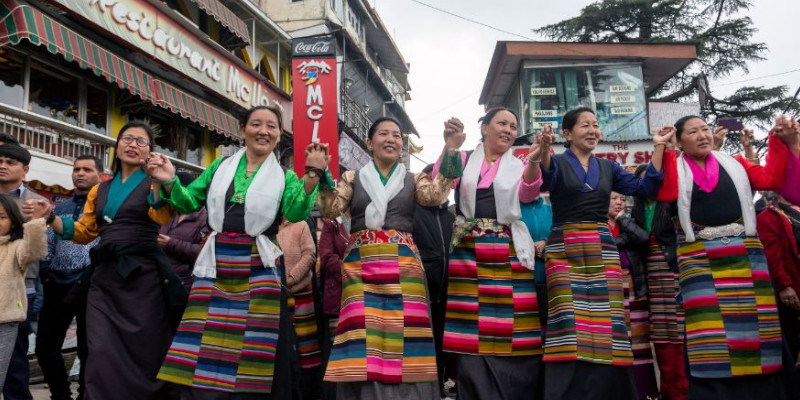
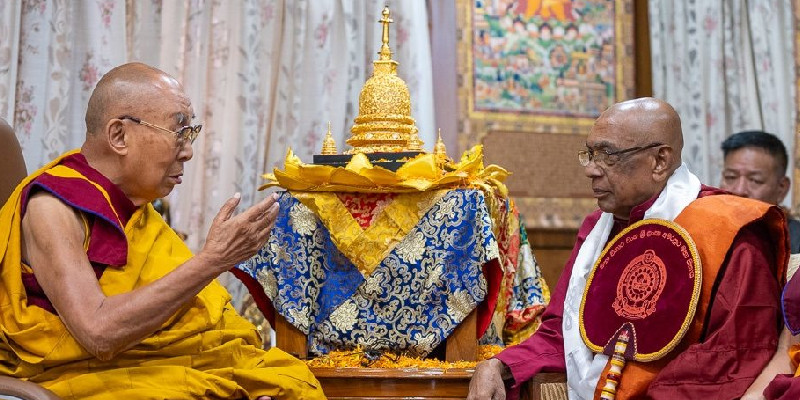
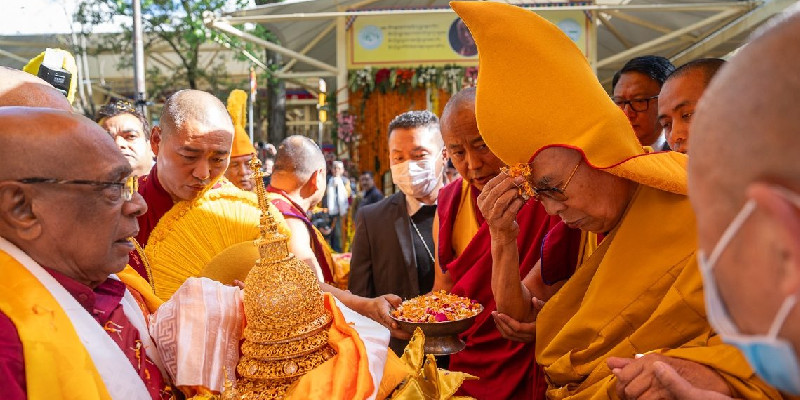
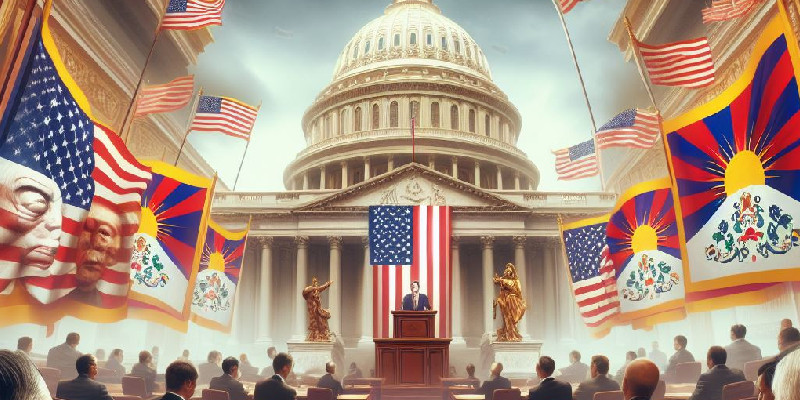

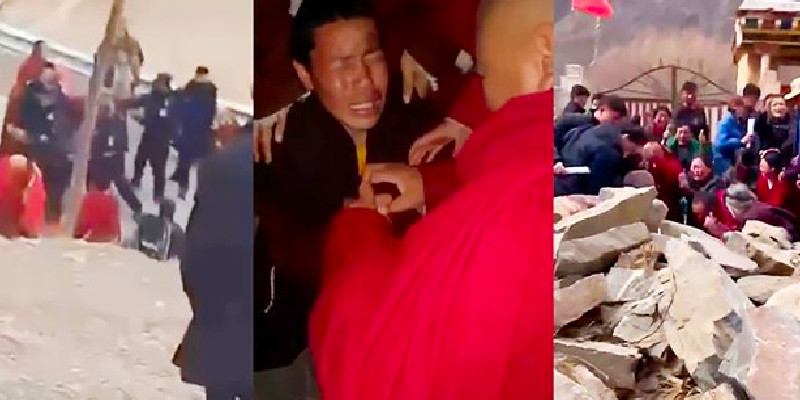
Leave a Reply